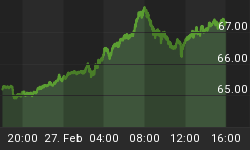Below is an excerpt from a commentary originally posted at www.speculative-investor.com on 15th July, 2010.
Strangely, many economists have a mental block when it comes to money. They just can't seem to get their heads around what money is, what the quantity of money should be, how the money supply should be measured, and how changes in the money supply affect the economy. Even the late great Milton Friedman had a mental block about money and unfortunately passed it along to most of his followers. For example, the block is evident in the latest quarterly outlook produced by Hoisington Investment Management (HIM). The authors of this report make a lot of good points about debt, unemployment and the government's attempts to "stimulate" the economy via deficit spending, but then completely lose the plot once they delve into monetary theory. Some of their errors are discussed herewith, but we'll first note that money is simply the general medium of exchange. Nothing more, nothing less. All other functions of money are secondary to its role as the general medium of exchange.
Some important logical errors are revealed by the following short excerpt from the above-linked HIM report:
"Although gold coins were once used [as money], gold is so illiquid that it is not even considered to be a form of near money -- though it is still widely thought of as a store of value. Since its price can fluctuate widely and unpredictably, it no longer serves well as a medium of exchange or as a unit of account."
By the comment "gold is so illiquid" HIM probably means that there isn't enough gold in the world for gold to be the general medium of exchange. The reality, however, is that if something has the right characteristics to be money (fungible, easily divisible and transportable, etc.) then any quantity will be just as good as any other quantity. For example, consider two scenarios where everything is the same except that in scenario 1 the money supply has always been "X" and in scenario 2 it has always been "10X". Money prices under scenario 2 will simply be 10-times higher than under scenario 1, but relative prices will be the same (if a particular type of car costs the equivalent of 10,000 bushels of corn under scenario 1 then it will also cost the equivalent of 10,000 bushels of corn under scenario 2). To put it another way, the purchasing power of each monetary unit will adjust to whatever the total supply of monetary units happens to be.
A consequence of the above is that there is no such thing as the correct, or optimum, supply of money. The important thing is that whatever the supply of money happens to be, it doesn't vary by much each year.
The total aboveground supply of gold doesn't vary by much from year to year, which is one of the reasons gold functioned so efficiently as money for thousands of years prior to the Twentieth Century, and why it would, if given the chance, do a good job in the monetary role today.
The comment "Since its [gold's] price can fluctuate widely and unpredictably, it no longer serves well as a medium of exchange or as a unit of account" is absurd. If gold were the medium of exchange then its price would not fluctuate widely. The reason its price fluctuates widely is that it is NOT the medium of exchange, but is, instead, priced in terms of unstable media of exchange such as the US$.
To avoid being too longwinded we'll now summarise some of HIM's other money-related errors and half-truths in point form:
1. HIM states that the Monetary Base (MB) is not money, which is not totally wrong but is also not accurate. The MB comprises bank reserves, which are not money and are not counted in most measures of total money supply, and currency notes in circulation, which most definitely are money and are counted in all of the monetary aggregates that we know of.
2. HIM points out that the Fed's 2008-2009 addition of $1.2 trillion to bank reserves did not constitute "money printing", which is technically true. As mentioned above, bank reserves aren't counted in the money supply. However, it is likely that the boost to bank reserves will eventually add to the inflation problem because at some future time the banks will lend this money into the economy in an attempt to increase their profits.
3. HIM argues that the Fed will be unable to expand the total supply of money as long as the problem of "overindebtedness" persists. This conclusion is quite common and appears to stem from the mistaken belief that the Fed's power to inflate is limited to adding bank reserves, meaning that the Fed's ability to bring about monetary inflation is completely dependent on the private banks being willing and able to make new loans. It is strange that this belief still lingers even though the Fed proved it wrong by rapidly growing the money supply after September-2008 in parallel with a contraction in bank lending. The Fed did this by purchasing assets from non-banks using newly-created money, thus bypassing the "zombie" banks and pumping money directly into the economy.
4. HIM appears to believe that money-market funds and time deposits, which are components of M2 and M3, are money. As we've explained many times in the past, this is not the case. Money-market funds, for example, are investments in interesting-bearing securities that must be sold in order to obtain money. As also previously explained, much of the past year's decline in M2 and M3 is due to reductions in the NON-MONETARY components of these aggregates.
We aren't offering a free trial subscription at this time, but free samples of our work (excerpts from our regular commentaries) can be viewed at: http://www.speculative-investor.com/new/freesamples.html.















